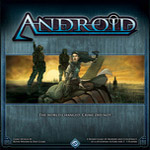The world changed. Crime did not.
Early in the month of November I had the good fortune to host a session of Android at MACE, a local gaming convention in High Point, NC. Android is a difficult game to get played during casual game days, it’s long (about 4 hours with new players), it has an undeserved reputation for being complex, and it requires enormous amounts of table space. These barriers to play have lead to very polarized opinions and reviews which is unfortunate because Android provides one of the most immersive experiences you can get from a board game and is well worth the effort invested in playing.
The Setting:
Android was released by Fantasy Flight Games in 2008 and is described by the publisher as “a board game of murder and conspiracy in a dystopian future for 3 to 5 players.” The game takes place sometime in the later half of the 21st century. Each player takes the role of a detective commissioned by the New Angeles Police Department to solve one of five important crimes chosen at the start of the game. Players travel in flight-capable vehicles throughout the city of New Angeles, the lunar colony Heinlein, and through The New Angeles Space Elevator that connects the two, known by the locals as “The Beanstalk.”
A conspiracy lies behind each investigation. Two rival companies are locked in fierce competition creating cheap human labor replacements. Haas-Bioroid has recently succeeded in creating fully sentient and independent thinking androids (perhaps too independent) while the Jinteki Corporation has developed a process to rapidly accelerate the growth of human clones, introducing experimental psychic abilities with unfortunate mental stability side effects. In response to these developments, a sometimes violent coalition of human workers has formed known as Humans First fighting against their displacement in an already difficult economic environment.
Android’s theme closely resembles the classic Ridley Scott film Blade Runner, in fact, numerous references to classic science fiction movies and literature may be found throughout the game. Some of these references are as simple as location names; others are major game mechanics such as Isaac Asimov’s three laws of robotics which serve to both enhance and restrict the android detective Floyd’s progress in the case.
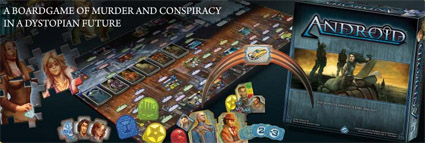
Game Play:
Android is a highly competitive game with almost constant player interaction. To win, detectives must balance their use of time between three important goals; building a case in the murder investigation, uncovering the conspiracy that lies behind the murder, and attending to their own personal plotlines.
The detective players have two weeks to build a case. Building a case against a suspect requires the careful collection and play of evidence tokens. Surprise witnesses, alibis, perjury, and occasionally assassination can be used to implicate one suspect, clear another, or eliminate a suspect all together.
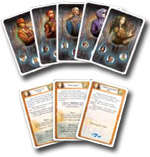 Each detective must also manage their own personal demons in the form of plot cards which describe life events for the detectives outside of the case. The psychic clone Caprice Nisei may be fighting for the freedom of her clone sisters which the Jinteki Corporation views as products, detective Raymond Flint is brilliant but suffering from Post Traumatic Stress Disorder which affects his memory, the detective android Floyd is faster and smarter than any human but is constrained by his programming. Detectives Louis Blaine and Rachel Beckmann have their own issues, as well. Accumulating positive emotional baggage will steer these plots toward happy resolutions, providing game play benefits and ultimately scoring points, negative emotional baggage is played on your opponent’s plotlines attempting to steer them toward less successful or sad outcomes.
Each detective must also manage their own personal demons in the form of plot cards which describe life events for the detectives outside of the case. The psychic clone Caprice Nisei may be fighting for the freedom of her clone sisters which the Jinteki Corporation views as products, detective Raymond Flint is brilliant but suffering from Post Traumatic Stress Disorder which affects his memory, the detective android Floyd is faster and smarter than any human but is constrained by his programming. Detectives Louis Blaine and Rachel Beckmann have their own issues, as well. Accumulating positive emotional baggage will steer these plots toward happy resolutions, providing game play benefits and ultimately scoring points, negative emotional baggage is played on your opponent’s plotlines attempting to steer them toward less successful or sad outcomes.
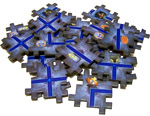 The conspiracy is perhaps the most interesting mechanic in a game with many innovative features. The conspiracy is represented as a puzzle. Detectives investigating the conspiracy lay down puzzle pieces building links between the conspiracy and various parties that might be involved. Connecting companies, labor unions, or powerful individuals to the conspiracy increases the scoring opportunities in the game.
The conspiracy is perhaps the most interesting mechanic in a game with many innovative features. The conspiracy is represented as a puzzle. Detectives investigating the conspiracy lay down puzzle pieces building links between the conspiracy and various parties that might be involved. Connecting companies, labor unions, or powerful individuals to the conspiracy increases the scoring opportunities in the game.
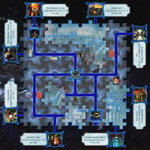 There are many paths to victory and each detective requires unique strategies to be successful. Some are stronger at investigating the murder while others excel at uncovering the conspiracy, all must be careful to keep their personal lives in check. It’s a testament to the care that went into the design of this game that the experience of playing each detective varies so widely yet the game remains balanced with equal chances for each to win.
There are many paths to victory and each detective requires unique strategies to be successful. Some are stronger at investigating the murder while others excel at uncovering the conspiracy, all must be careful to keep their personal lives in check. It’s a testament to the care that went into the design of this game that the experience of playing each detective varies so widely yet the game remains balanced with equal chances for each to win.
Opinions:
At this point it should be no secret that I love this game and I’ve had great success with the people I’ve introduced it to. My opinion, however, is not universally shared. As mentioned previously; opinions of Android have been polarized with very little middle ground. One of the complaints leveled at Android is that it is not a deductive logic game like Clue. It’s not, get over it. There is no predetermined murderer at the start of the game, nor are the connections in the conspiracy predetermined. Instead, players create a story line through game play and attempt steer that story in a direction most advantageous to their detective. Android plays much more like an episode of Law and Order where detectives start with hunches and try to build a case to match.
Another objection raised is complexity. There is a lot going on in a game of Android, however, most of the rules flow organically from the theme. At first glance the 40-page rule book looks intimidating, but it’s filled with illustrations and examples and is actually a fairly easy and enjoyable read. There are games in my collection with much shorter rule books and while they may be good games in their own right, many of those rule books were harder to get through. That having been said; don’t pull the shrink wrap off a game of Android and drop it on the table in front of four expectantly waiting friends, this will surely leave a sour taste in everyone’s mouth. Read the rules, try a few practice turns, then read the rules again. New players can pickup the game with about 20 minutes of instruction but only if the game host knows the rules cold.
The last common complaint is game length. If your gaming tastes lean toward sixty minute euro-style games this is not the game for you. If you like Arkham Horror (which not coincidently is from the same game designer Kevin Wilson) or if you’re into role playing games but want to try something competitive, you’ll appreciate Android’s cinematic scope. Issues with game length may also be mitigated somewhat. Although the game will support up to 5 detective players I strongly recommend playing with only 3 or 4. There are enough moving parts in a game of Android that it does not need to be played at its maximum player count to experience the full flavor of the game.
If you’re ever at a gaming convention with open seats in a session of Android sign yourself up, you won’t be disappointed. If you’re interested in trying the game on your own Android lists for $59.95 although it can typically be found for 30% to 40% less at retail. It takes some time and patience to properly prepare for play but you and your players will be rewarded with an experience not easily captured by smaller games.
When not playing games, Bob Gallo is a computer programmer specializing in Flash and interactive application design living in the Charlotte, NC area. Bob got his gaming start in the mid 1970s with traditional hex-and-counter war games and has played nearly all types of games including role playing games, miniatures, collectible card games, video/PC games as well as traditional board and card games.










